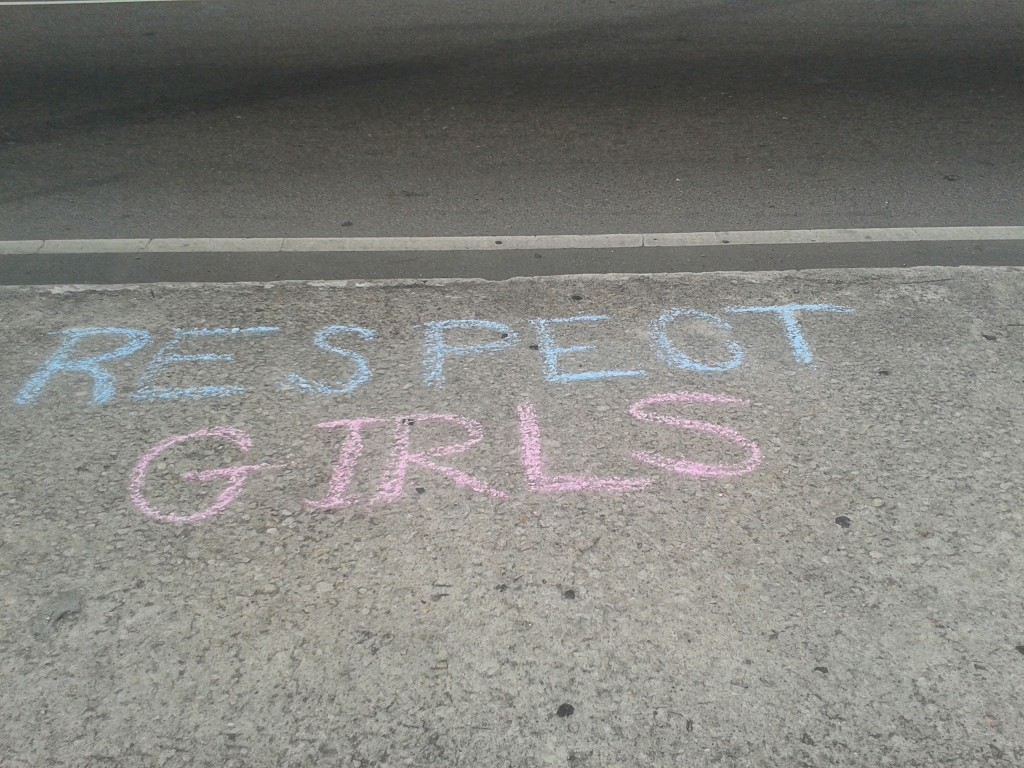Alicia Wallace, Nassau, The Bahamas, Blog Correspondent

The first time I was street harassed, I was with my mother, wearing a plaid jumper, and 8 years old. It was terrifying, embarrassing, and guilt-inducing. My mother was furious, but I couldn’t tell whether the object of her rage was the creepy 30-something man or me.
“That’s a pretty girl, eh?”
My chest overheated and I froze. Something about it wasn’t right.
“Whatchu sayin’ mother-in-law. I wan’ marry your daughter.”
I looked at her, but quickly realized that was a bad call.
“Get in the car!” she roared.
I did, my head down, legs shaking, wishing my father was there because, surely, this would not have happened in his presence. Men may have looked when his back was turned, but no one had ever dared to say anything. To be honest, my memory and telling of this story is probably colored by my innocence, shock, and youth at the time, but that is, without prejudice, what happened.
Not much has changed since then. My mother doesn’t have to drive me everywhere, I don’t wear a school uniform, and there’s a 2 in front of that 8, but things are basically still the same. The feminist in me hates the truth in it, much less to admit it, but I always wish for the presence of my father or my brother when I’m harassed. They are still my protectors. They are still my best prevention tactic. In the eyes of the world at large, I am still only made safe, only honored, only protected, only of value and worth because of my relationship to men. Black men. Tall men. Thick men. Men with beards. Men with deep voices. Men with an authoritative walk. A powerful voice. A monopoly on strength. Testosterone. Oozing heterosexuality. Prone to violence. Voted most likely to bust a cap in someone for their woman – be she a mother, wife, daughter, or girlfriend – at the drop of a hat.
I’m not the only person who ever had that experience. I’ve had conversations with people of different ages and races about street harassment and how it made them feel. I spoke, as Director of Hollaback! Bahamas to a group of 8-12 year old girls about street harassment, and watched with horror as they each raised their hands in answer to the question, “How many of you have experienced street harassment?”
In The Bahamas, there’s an idea that girls only experience street harassment and other acts of sexual violence because their behavior or presentation is inappropriate. Her skirt is too short. She’s wearing too much lip gloss. Her mother was “like that”. Ain’ no daddy in that house. She likes grown people’s conversations too much. She walks “too slack”. She, she, she, she, she.
There’s also the overriding idea that people must be courteous, and this means speaking to everyone you see or pass. It’s not unusual for people to say a general “Good morning” when entering an occupied space which includes doctors’ offices, classrooms, banks, stores, and buses. This extends to the street, people greeting one another in passing on sidewalks.
The capital of this archipelago of islands, Nassau, is 21×7 miles. It is, indeed, a little rock. There was a time when all of its inhabitants – like other islands – were connected. People reprimanded children walking by after the school had rung because they knew it was so-and-so’s son or daughter. Those days, however, are a relic of the past, no matter how tightly anyone tries to hold onto it. The population of this country is reaching for 400,000, and I’d venture to guess that one-third of it lives in Nassau. This little rock is densely populated, and the degrees of separation have increased and decreased the likelihood that we can identify one another as Miss Madeline’s grandson or the tuck shop lady’s son-in-law. As a result, common courtesy is a bit less common, and there are many who continue to fight this change, seeing it as a plague brought by a rebellious generation. This, of course, is false.
Let’s take a moment to reflect on the memory of an 8 year old girl in her elementary school uniform, crossing the street with her mother. Think of the fear she felt when a man her father’s age spoke of marrying her. Feel her shame when her mother shouted at her to get in the car. Cary the weight of the blame she carried for years, and the burden of trying to make sure it never happened again. How could she find the balance between exercising her good manners and “keeping herself to herself”? No little girl should ever have to navigate this terrain, but for many Bahamian girls, this is a part of growing. There is little choice, and decisions have to be made. That 8 year old girl shouldn’t have to act based on expectations of good manners rather than her own safety, confidence, and comfort, the problem is not that little girl. Let’s face it. Those things are mutually exclusive.
We’ll explore the real reason for the evolution of societal interaction in Part II.
Alicia is a freelance writer and public educator in Nassau, Bahamas. You can connect with her on Twitter (@_AliciaAudrey and on her blog.
